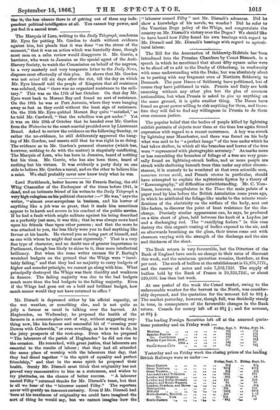;Lord Northbrook, better known as Sir Francis Baring, the old
Whig' Chancellor of the Exchequer of the times before 1841, is -deed, and an intimate friend of his writes to the Daily Telegraph a verryltigh enlegium onitis political character :—" He was," says the 'writer, -64 almost over-scrupulous in business, and his horror of anything like a job was so great, that it inade him sometimes -appear to be harsh and severe in his conduct of the public service. If he had a fault which might militate against his being described as a perfectly jest man, it was this ; that he was always more hard upon his friends than 'upon -other persons ; and that the more he was attached to.yon, the less likely were you to find anything like favour at his bands. He-viewed you as being part of himself, and . as one with 'whom: he might deal most rigorously." That is a very fine type of character, and no doubt-one of greater importance to Parliament, though 'less likely to shine in it, than mere intellectual brilliancy. But -When the -same writer excuses Sir F. Baring's wretched budgets- on the retnnd that the Whigs were " inevi- tably falling," and that they had no majority to carry budgets Of higher and sounder -principle we cannot go alongWith him. 'What principally destroyed the l'Aigs was their thniffity and weakness „in finance. The failing majority was due to the bad budgets much more than the bad budgets- to the failing majority. Even if the Whigs had gone out on a bold and brilliant budget, how
-much sooner would they not have returned to office ?






























 Previous page
Previous page